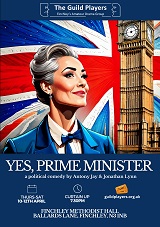Holmes Sweet Holmes
or 'The Old Time Music Hall Mystery'
written & directed by Laurie Heatherington
A play with music based on "A Scandal in Bohemia" and "The Case of the Illustrious Client" by Sir Arthur Conan Doyle. With apologies and thanks to W.S. Gilbert, Sir Arthur Sullivan and also all the writers for the Old Time Music Hall whose work we use.
November 1988
Thursday 24th
Friday 25th
Saturday 26th
The action is set in Old London Town at The Old Collins Music Hall one autumn almost a century ago when Sherlock Holmes is at the peak of his powers.
Act I
Opening sequence
Scene 1 : Holmes's Rooms at 221b Baker Street
Scene 2 : The Stage of the Old Collins Music Hall
Scene 3 : Backstage at the Music Hall
Scene 4 : Holmes's Rooms at 221b Baker Street
Scene 5 : A London Street
Act II
Opening : The Stage of the Old Collins Music Hall
Scene 1 : A London Street
Scene 2 : Inside St Monica's Church
Scene 3 : Backstage at the Music Hall
Finale
| Cast | |
| Beerbohm Stump, adroitly adept at alliteration | Brian McFarland |
| Sherlock Holmes, the doyen of detectives | John Savage |
| Dr John Watson, his solid supporter | James McLauchlan |
| Gertrude Hudson, landlady extraordinaire | Renee Heatherington |
| The King of Bohemia, a man of mystery | Alan Jobson |
| The Baker Street Irregulars, tattered but true | Carolyn Pike |
| Gill Hefford | |
| Katie Winton | |
| Ruth Crawford | |
| Bianca Mudu | |
| Sharon Selby | |
| Stephanie Jones | |
| Simon Prendergast | |
| Irene Adler, the diva divine | Anthea McLauchlan |
| Tillie, feats of strength and memory | Pauline Harkness |
| Kitty Winter, springing from the chorus | Carol Brown |
| Godfrey Norton, seen by all the best judges | Jeff McCracken-Hewson |
| Violet de Merville, only a soldier's daughter | Fiona Soutar |
| The Baron Gruner, elegantly evil | Clive Long |
| Gorgiano, dastardly deeds dreadfully done | Norman Burgess |
| Professor Moriarty, still an infant in infamy | Oliver Broadway |
| Shinwell Johnson, the cockney coster | Michael Sparks |
| The Vicar, none quicker | Sidney Broadway |
| Ladies & Gentlemen of the Chorus | Samantha Clemson |
| Margrit Pike | |
| Mair Riordan | |
| Kathryn Sizeland | |
| Dennis Lammas | |
| Geoff Moxon | |
| Musicians | |
| Director and Piano | Sheila Bailleau |
| Double Bass | Erica Gerrard |
| Oboe | Valerie Bignell |
| Percussion | Roy Mistry |
| Tap dances choreographed by | Melodie Hughes |
| Backstage Team | |
| Stage Manager | Derek Burtenshaw |
| Set designed & cut-outs made by | Allan Stevens |
| Set built by | Norman Burgess |
| assisted by | Dennis Lammas |
| Lighting | Steve Mansell-Jones |
| assisted by | Ian Henderson |
| Sound Effects | Derek Sizeland |
| Properties | Fiona Soutar |
| Costumes | Christine Fells |
| assisted by | Carolynn Shaw |
| Kathleen Parker | |
| Dorothy Moir | |
| Company Manager | Beryl Hughes |
| House Manager | Lyn Cameron |
| Publicity | Carol Brown |
| Box Office | Betty Burgess |
| Norman Burgess | |
Programme Notes
This year marks the centenary of the appearance of the first Sherlock Holmes book - "A Study in Scarlet". Although judged too short for a novel and too long for a short story, the book nevertheless sold out and, like the rest of the Sherlock Holmes canon, has never been out of print since. The stories have been translated into all the major languages of the world and created a cult that still persists today. So much so that the Building Society which now occupies 221 Baker Street has to employ someone full time to answer correspondence still being addressed to Sherlock Holmes!
The famous detective's period of activity coincided with the great days of the Music Hall and I have tried to bring both these very English institutions together in "Holmes Sweet Holmes", which is my centenary tribute to the great man. The two stories on which the play is based appeared originally in The Strand Magazine, but neither was set in a Music Hall, so I have had to take a few liberties to bring that about. Also, although the elements of the two plots remain, as does much of the dialogue from the stories, quite a lot of additional dialogue has been added. You should have no difficulty in identifying which is which!
With the exception of Tillie and the Music Hall Chairman who are inventions of my own, all the characters in the play are drawn from these or other Sherlock Holmes stories. Of course, whether Sir Arthur Conan Doyle would recognise them all as his creations, is another matter entirely. I take comfort in the thought that, as the author had begun to find his most famous character a burden he could not get rid of - although he tried - the thought of Holmes being sent up a bit would not be enough to make him turn in his grave. Perhaps he is even laughing at the joke. I hope so. And I hope you do too.
L.N.H. November 1988



